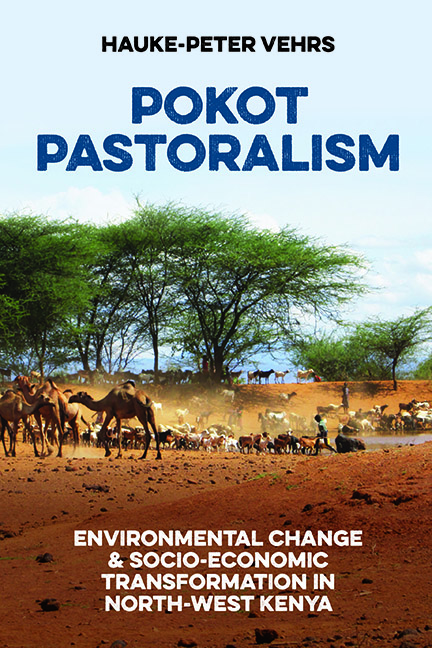Book contents
- Frontmatter
- Dedication
- Contents
- List of Illustrations
- Preface and Acknowledgements
- List of Abbreviations
- 1 Introduction
- 2 East Pokot: A Place and its People
- 3 Pokot Pastoral Livelihoods
- 4 The Paka Community
- 5 Environmental Changes in East Pokot
- 6 Socio-Ecological Transformations in the Agro-Pastoral Highlands
- 7 Ecological Change and Local Livelihoods: Scientific and Pokot Perspectives
- 8 Ecological Invasions: Agents of Socio-Ecological Transformation
- 9 Ecological Challenges and Social Transformations
- Appendix: Lists of Plant Names (Pokot–Scientific and Scientific–Pokot)
- Bibliography
- Index
- Future Rural Africa
8 - Ecological Invasions: Agents of Socio-Ecological Transformation
Published online by Cambridge University Press: 16 July 2022
- Frontmatter
- Dedication
- Contents
- List of Illustrations
- Preface and Acknowledgements
- List of Abbreviations
- 1 Introduction
- 2 East Pokot: A Place and its People
- 3 Pokot Pastoral Livelihoods
- 4 The Paka Community
- 5 Environmental Changes in East Pokot
- 6 Socio-Ecological Transformations in the Agro-Pastoral Highlands
- 7 Ecological Change and Local Livelihoods: Scientific and Pokot Perspectives
- 8 Ecological Invasions: Agents of Socio-Ecological Transformation
- 9 Ecological Challenges and Social Transformations
- Appendix: Lists of Plant Names (Pokot–Scientific and Scientific–Pokot)
- Bibliography
- Index
- Future Rural Africa
Summary
This chapter takes up the notion of inherently changing pastoral landscapes more generally. My understanding of the transformations of pastoral landscapes in the past centuries is based on the awareness that multiple agents are involved in an ongoing process of land-use and land-cover changes. These changes are not unusual, and I would assert that pastoral landscapes are continually exposed to changes on different levels. Scientific works on other pastoral groups and their changing environments have paid much attention to the actions of pastoral groups and their impact on their environments, ranging from allegations of landscape degradation and desertification (Hare et al., 1977) to lauding their position as pastoral stewards of the environment (Heine, 2015). Both these perspectives focus on the strategies of pastoral groups, but hardly on the other landscape agents involved in forming and maintaining pastoral landscapes. The perspective towards the landscape and other agents of land-use and land-cover changes to be found beneath the pastoralist level is often neglected, and few scientific accounts focus directly on pastoral landscapes and their transition processes.
Nonetheless, one good example is the great work of Reid et al. (2005) who describe and compare the grasslands in East Africa taking the examples of Sudan, Eritrea, Djibouti, Ethiopia, Somalia, Uganda, Kenya, Rwanda, Burundi and Tanzania. For their study on changing pastoral landscapes, they took various factors into account such as population and livestock densities, ecological vegetation zones, wildlife population densities, non-pastoral land-use strategies and different grassland zones with varying grass species compositions (Reid et al., 2005). The authors also identify trends towards bush encroachment, the fragmentation of pasture land, the implementation of farming, changing fire regimes, conflicts with wildlife populations, the spread of animal diseases, the competition with non-pastoral land uses such as farming and the difficult situation for pastoral groups when dealing with the rapid changes of the recent past. They mention that under these conditions, ‘pastoral success depends largely on tracking patchy resources through time’ (Reid et al., 2005, p. 46) and that pastoralists must maintain both their access to key resources and their high mobility to ensure the success of their livelihoods.
This need also implies that pastoral groups must respond to externally driven transformation processes such as development projects that operate in their regions or the designation of conservation areas for wildlife protection and tourism.
- Type
- Chapter
- Information
- Pokot PastoralismEnvironmental Change and Socio-Economic Transformation in North-West Kenya, pp. 168 - 180Publisher: Boydell & BrewerPrint publication year: 2022



